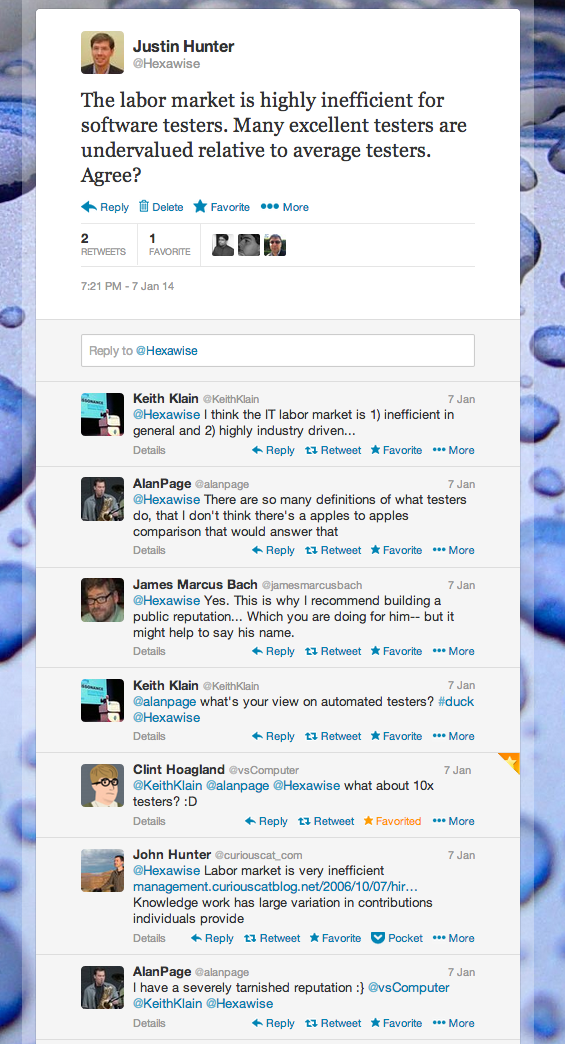Software Tester Value - Inefficient Labor Market

Software Tester Value - Inefficient Labor Market
The process used to hire employees is inefficient in general and even more inefficient for knowledge work. Justin Hunter, Hexawise CEO, posted the following tweet:
The labor market is highly inefficient for software testers. Many excellent testers are undervalued relative to average testers. Agree?
The tweet sparked quite a few responses:

I think there are several reasons for why the job market is inefficient in general, and for why it is even more inefficient for software testing than for most jobs.
-
Often, how companies go about hiring people is less about finding the best people for the organization and more about following a process that the organization has created. Without intending to, people can become more more concerned about following procedural rules than in finding the best people.
-
The hiring process is often created much like software checking, a bunch of simple things to check - not because doing so is actually useful but because simple procedural checks are easy to verify. So organizations require a college degree (and maybe even require a specific major). And they will use keywords to select or reject applicants. Or require certification or experience with a specific tool. Often the checklist used to disqualify people contains items that might be useful but shouldn't be used as barriers but it is really easy for people that don't understand the work to apply the rules in the checklist to filter the list of applicants.
-
It is very hard to hire software testers well when those doing the hiring don't understand the role software testing should play. Most organizations don't understand, so they hire for software checkers. They, of course, don't value people that could provide much more value (software testers that go far beyond checking). The weakness of hiring without understanding the work is common for knowledge work positions and likely even more problematic for software testing due to the even worse understanding of what they should be doing compared to most knowledge workers.
And there are plenty more reasons for the inefficient market.
Here are few ideas that can help improve the process:
-
Spend time to understand and document what your organization seeks to gain from new hires.
-
Deemphasize HR's role in the talent evaluation process and eliminate dysfunctional processes that HR may have instituted. Talent evaluation should be done by people that understand the work that needs to get done. HR can be useful in providing guidance on legal and company-decided policies for hiring. Don't have people that can't evaluate the difference between great testers and good testers decide who should be hired or what salary is acceptable. Incidentally, years of experience, certifications, degrees, past salary and most anything else HR departments routinely use are often not correlated to the value a potential employee brings.
-
A wonderful idea, though a bit of a challenge in most organizations, is to use job auditions. Have the people actually do the job to figure out if they can do what you need or not (work on a project for a couple weeks, for example). This has become more common in the last 10 years but is still rare.
-
I also believe you are better off hiring for somewhat loose job descriptions, if possible, and then adjusting the job to who you hire. That way you can maximize the benefit to the organization based on the people you have. At Hexawise, for example, most of the people we hire have strengths in more than one "job description" area. Developers with strong UI skills, for instance, are encouraged to make regular contributions in both areas.
-
Creating a rewarding work environment helps (this is a long term process). One of the challenges in getting great people is they are often not interested in working for dysfunctional organizations. If you build up a strong testing reputation great testers will seek out opportunities to work for you and when you approach great testers they will be more likely to listen. This also reduces turnover and while that may not seem to relate to the hiring process is does (one reason we hire so poorly is we don't have time to do it right, which is partly because we have to do so much of it).
-
Having employees participate in user groups and attending conferences can help your organization network in the testing community. And this can help when you need to hire. But if your organization isn't a great one for testers to work in, they may well leave for more attractive organizations. The "solution" to this risk is not to stunt the development of your staff, but to improve the work environment so testers want to work for your organization.
Great quote from Dee Hock, founder of Visa:
Hire and promote first on the basis of integrity; second, motivation; third, capacity; fourth, understanding; fifth, knowledge; and last and least, experience. Without integrity, motivation is dangerous; without motivation, capacity is impotent; without capacity, understanding is limited; without understanding, knowledge is meaningless; without knowledge, experience is blind. Experience is easy to provide and quickly put to good use by people with all the other qualities.
Please share your thoughts and suggestions on how to improve the hiring process.
Related: Finding, and Keeping, Good IT People - Improving the Recruitment Process - Six Tips for Your Software Testing Career - Understanding How to Manage Geeks - People: Team Members or Costs - Scores of Workers at Amazon are Deputized to Vet Job Candidates and Ensure Cultural Fit


